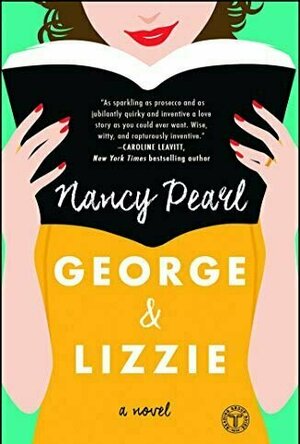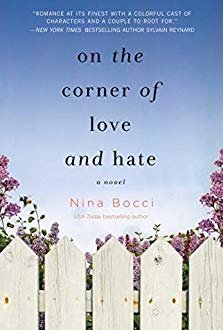Kristy H (1252 KP) rated George and Lizzie in Books
Oct 29, 2020
In high school, Lizzie made a choice--one she soon regrets--participating in something called the Great Game. The event alters the course of her life forever, along with a passionate relationship that ends in college. These moments, plus the influence of Lizzie's psychologist parents, who offer her little support as a kid, turn her into a melancholy and unfulfilled adult. Her husband, George, however, comes from a happy childhood with loving parents. He adores his family and they him. He also worships Lizzie, giving the two an unbalanced marriage. Can George and Lizzie survive an union on such unequal ground?
I'll confess that this book was not what I was expecting--I thought it was going to be a cheerful love story and a pick-me-up. It is a love story, though, all the same. George loves Lizzie. Lizzie, though, is lost in a love from the past. I'm not going to lie: Lizzie is a very frustrating character and a hard one for whom to care. She doesn't appreciate George, nor, really, much of her life. Now, she was truly saddled with terrible parents, so you have to grant her that. Her fixation on her past relationship makes you want to shake her, though.
"And because for years and years the voices in her head never let Lizzie forget that the Great Game had been a stupid idea right from the beginning and that she'd been an idiot for participating in it, her past was always there, a living thing. It shaped her present and future."
And of, of course, there is the Great Game--the event from high school which alters Lizzie's future. We can understand why Lizzie is Lizzie, but we can't always forgive her for her Lizzie type ways. Also, please note, there are a lot of football references in this book. A lot. I like football, but I'm not sure everyone who picks up a book like this will feel the same.
The story of George and Lizzie is told in very short vignettes (each with a title) that slowly move forward in time and alternate with Lizzie's past, mainly focusing on the Great Game, which so defined her life. This format takes much getting used to. There is no linear story here, but tiny bits and pieces of narrative from George and Lizzie. I almost abandoned the book when I first started--I couldn't get in the groove (and honestly, it's depressing). When I reluctantly returned to it a few days later, more prepared for the format, I could read it more easily.
In the end, I can't say I enjoyed this story. If I rated it purely on "like" factor, it would probably be a two-star read. Incorporating in Lizzie's life experiences and how a few things slowly grew on me, I'm giving this three stars, but only barely. (Also, I have real issues with how many kids from Lizzie's high school football team went on to the NFL. Maybe it's possible, but it seems insane.) 3 stars, but only eked out when they brought the chains out on the field to measure (too much?).
Debbiereadsbook (1669 KP) rated Reveal (Hidden Cove Season4, #4) in Books
Sep 29, 2019
I have not READ this book, just listened, so if my review lines blur, I’m sorry, but I’m not sure I can split the narration from the story itself, and I ususally at least TRY to.
Jason is a geek, a rocket scientist for God’s sake. Channing, a firefighter. They really don’t have much in common, other than a childhood of living next door to each other. So when Channing rescues Jason from the taunting that is a constant in his life from the guys at work, Jason does the only thing he thinks of, and asks Channing to be his *fake* boyfriend for a weekend work retreat. And Channing, the darling that he is, of course, says yes!
Oh! I LOVED these guys! I really did!
Jason is out and mostly proud. The guys at work make it hard for him though. Channing has only ever been with girls. But he thinks nothing of touching Jason, kissing him! Channing is, quite possibly, my favourite Ms Welch character! I loved how, while things creep up on Channing, when he questions them, to his best friend, Remi is, like *duh* well of course you are bisexual, you silly man!
When it all hits the fan, and their *fake* relationship is discovered, I loved how both men, separately and independently of each other, decided that they would wait for the other to make their own minds up, whether they wanted *this* to be real. Even if it meant they broke their hearts and had to walk away from the other. They did, of course they did, but it was painful but beautiful listening, as Jason dug deep into himself and found his TRUE self, not the one he THOUGHT he should be.
Nick J Russo narrates this book. And he does a cracking job!
His voices for Jason and Channing are different and distinctive, showing the marked differences in the lives so far. His reading voice is clear and even, and its part of why I love this narrator so much: his deep clear reading voice. You know the one, the one is telling the story. It makes for such easy listening, to a deaf head like me.
The voices for ALL the characters are clear, and I had no trouble keeping up with multi person conversations. I am intrigued by several of the supporting cast now, simply because of the voices that Russo gives them here! Remi and Kris especially! Harrison too.
Russo gets over all of Jason wish that they can work this out, that it be real. He gets over all of Channing’s dawning realisation of his true feelings for Jason, and we get all that love pouring out.
A narrator can only read the words they have been given, though and Ms Welch smashes this one out the park! Well, that was what I *THOUGHT* when I finished listening to this, I thought this was my favourite of this author so far. But before writing THIS review, I read Homeward Bound (Pine Cove #3) and now?? I can’t split them!
So, thank you, Ms Welch, for making the start of my work day a little more pleasant and thank you to Mr Russo for bringing these men to my ear (singular, like, cos one don’t work!)
5 full and oh so very cute stars for the book and the narration.
**same worded review will appear elsewhere**
Gareth von Kallenbach (980 KP) rated Why Him? (2016) in Movies
Jul 12, 2019
The highlights of this film include Cranston who reminds us that he has comedic timing from his years in Malcom in the Middle. His chemistry and timing is played well across Megan Mullally who perfectly delivers a few genuine laughs as a Midwestern suburban wife trying to maintain the niceties. Their son (Griffin Gluck) also adds to the humorous family affair as a teenage brother trying to be taken seriously as an adult but still being treated as a child. Lastly, the always funny Keegan-Michael Key hilariously plays Gustav, the “estate manager” to the tech-millionaire boyfriend and spices up the film every time he seems to appear.
James Franco on the other hand quickly wears out is welcome as the socially inept tech-millionaire boyfriend. At times he is funny, however after the dropping the “f-bomb” so many times you begin to sees him as a basic, depthless “caricature” only going for the low hanging fruit of crude jokes. Still, his crude, repeated, jokes are no longer funny after the first few times we see them. The film tries to give Franco some “mysterious depth” through an eluded troubled childhood and his genuine honesty. Only the film never gives you any payoff, as Franco’s character never actually evolves past his caricature shortcomings. It is a shame, because we actually like the girlfriend character (Zoey Deutch) and want to understand what she sees in Franco’s character, however since he never really evolves, there really is no reason to like or root for them to be together.
I also want to point out that this film acknowledges its biggest flaw. At one point in the film a character points out that there is a war going on between father and boyfriend, only the boyfriend isn’t actually fighting. That’s true, and thus there is no real conflict and no real reason to root for any of the characters. Franco’s boyfriend character never evolves past his caricature. While Cranston’s father character only evolves because the movie devolves into “paint by numbers” territory in the last 10 minutes. Since there is no one to root, we do not really care the outcome as we got our chuckles throughout the film but will forget about it shortly after walking out the theater.
Why Him? Has a solid cast, a few unexpected cameos and delivers constant chuckles throughout, however without giving us a likeable boyfriend or any characters to root for, the lack of memorable gut busting laughs has this film as nothing more than a typical forgettable comedy.
Kristy H (1252 KP) rated On the Corner of Love and Hate in Books
Sep 2, 2019
So I think it does a disservice to bill this book as a Christina Lauren-type romance, as I went in expecting a certain type of story and it just didn't deliver. I believe if I just read it as a romance, I might have enjoyed it more. And, please note, that a 3-star review isn't bad (!), I just didn't 4-star love love it.
The book is set up with the "love/hate" premise. We have hard-working Emma, who is scared of commitment and letting down her guard. Meanwhile, Cooper needs to buckle down and get serious about everything in his life. Emma holds a long-standing grudge against Cooper, but, of course, oh there are feelings, right? The problem is that things get repetitive: so much fighting about his bad behavior and then her thinking over and over about her feelings. (Of course she doesn't have feelings for Cooper, she hates him, etc.). We all know they are going to show some spark together, but good grief, it takes forever.
"He might have been the single most irritating person in the world to me, but still, I could appreciate his appearance."
Also, while I liked that there were political things woven into this novel, my goodness, I've never seen such drama over a mayoral race in my life. Is this a small town thing, or something? I have lived in small towns. The attention and drama focused on this race felt like a senatorial campaign and there was little explanation why Cooper's opponent was so bad, except that he was, indeed, really bad and would ruin the whole town, so this portion felt very two-dimensional. (Oh and if Emma called her father "Mayor Dad" one more time, I was going to scream.)
Still, this is a cute read. There are some really fun scenes with Emma's friends--she, Nick, Henry, and Cooper have been pals since they were kids. There is wit and humor throughout the book. I could certainly identify with Emma, being a closed off workaholic myself! The small town vibe in this book is really adorable--Hope Lake practically flies off the page, and it's a very atmospheric setting.
And, let's be honest: a love/hate dynamic is enjoyable. We pick up a romance knowing exactly what we are getting into. Cooper was a bit irritating at times, but it still boils down that I'm a total sucker for a sappy love story and the chosen two getting together. I was rooting for these two, and I liked the end of the book. This was a sweet, funny read overall. 3 stars.

Jungle Animal Hair Salon 2 - No Ads
Games and Education
App
New hair styling and fashion adventures in Jungle Animal Hair Salon! Meet your beauty salon clients...

Never Look at the Empty Seats: A Memoir
Book
A tale of hard work, musical discovery, and faith, Charlie Daniels’s journey has been one of a...
Music biography

Wooden Block Puzzle Game
Games and Entertainment
App
It's FUN, simple and 100% RELAXING guaranteed! Get your BEST puzzle today! Let's join over...

Lingokids - English for Kids
Education and Entertainment
App
Lingokids is the best English learning app for kids aged 2-8. Now featuring content from Oxford...

Hannah's High School Crush
Games and Education
App
Hannah wants to look gorgeous on the first date with her secret high school crush Jack! Get ready...

Word Wizard for Kids
Education and Games
App
• "Speak ‘N Spell for the iPad Generation" - The New York Times • Word Wizard offers several...



